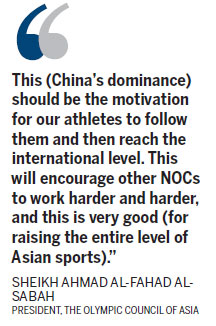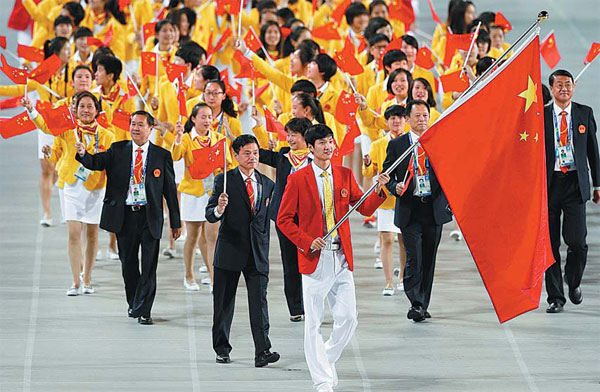Calls for nation's dominance to inspire, not impair, others





China's dominance at the Asian Games won't harm sports development in Asia but will push other countries to be even better, according to the head of Asia's top sports body.
As the Incheon Asian Games wrapped up with a festive closing ceremony on Oct 4, the Chinese delegation emerged as the top medal winner again, with 151 golds. This was well ahead of the 79 won by host South Korea and the 47 that went to Japan.
China's dominance in the Asian Games medal tally and win by a big margin has been the norm since the 1990 Asiad in Beijing.
The dominance led to concerns that China's supremacy could affect other countries' motivation to develop in certain sports like table tennis, badminton and weightlifting.
"Sometimes, you feel frustrated after losing to the same opponent many times and you might ask 'why would I continue?'," said Kenta Matsudaira, a Japanese table tennis player, after losing to a Chinese pair at the men's doubles semifinal.
The Olympic Council of Asia President Sheikh Ahmad Al-Fahad Al-Sabah said that the concerns were unnecessary.
"China ranked top of the medal list at the Beijing Olympics and second in London. For those athletes, they are not only champions in Asia but also around the world. If China is not on top at the Asiad, then there is a problem," said the president at an OCA press conference on Oct 4.

"This (China's dominance) should be the motivation for our athletes to follow them and then reach the international level. This will encourage other NOCs to work harder and harder, and this is very good (for raising the entire level of Asian sports)."
While China remains a sporting superpower, it has seen its dominance in certain strength events challenged and even weakened by fast-growing opponents, which could be a sign that Asia's sporting power is shifting towards a more balanced playing field.
In badminton, China bagged four golds out of the seven on offer, a deficit compared to its clean sweep at the 2012 London Olympics.
China's once-gold-mining weightlifting team also lost its supremacy in Incheon, when the neighboring Democratic People's Republic of Korea set five of the nine weightlifting world records made at the Asiad.
Some Western Asian countries, who sent naturalized African athletes to Incheon, also ate into China's accomplishments in track and field.
"We actually welcome such challenges as it makes the competition fiercer in Asia, which is a good thing for both China and opponents to work hard and grow," said Xiao Tian, deputy chef de mission of the Chinese delegation.
Despite China's huge gold medal haul the overall medal distribution at the Asiad was more balanced.
Among all the 45 National Olympic Committees that took part, 82 percent of them (37 NOCs) won at least one medal and 51 percent (28 NOCs) claimed at least one gold medal.
"This is something you should be proud of. This is the way we have to invest in the games. The number of China's medals is very high but I don't think it's a worry," said OCA President Al-Sabah.
sunxiaochen@chinadaily.com.cn
| The Chinese team at the opening ceremony of the Incheon Asian Games. Issei Kato / Reuters |
(China Daily European Weekly 10/17/2014 page14)
Today's Top News
- Japan tempting fate if it interferes in the situation of Taiwan Strait
- Stable trade ties benefit China, US
- Experts advocate increasing scope of BRI to include soft power sectors
- New engine powers cargo drone expansion
- China to boost green industry cooperation
- Manufacturing PMI rises in November



























